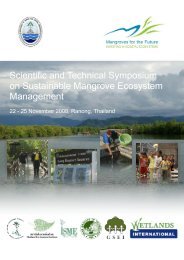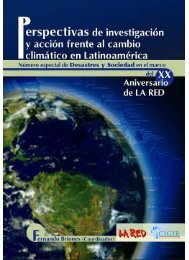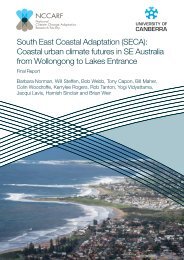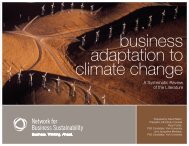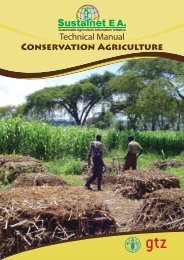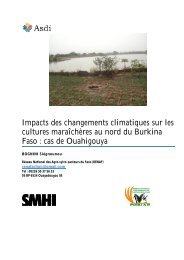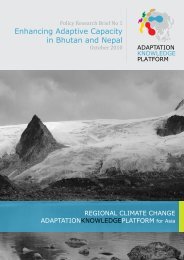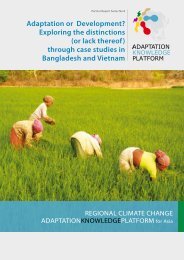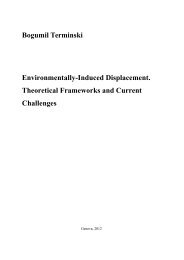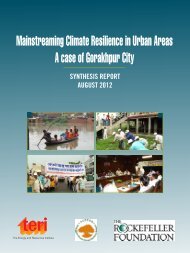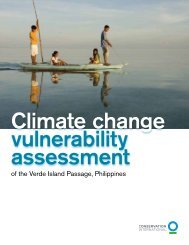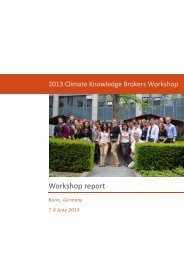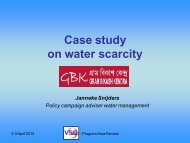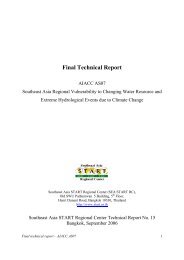despite many of the causes of <strong>food</strong> in<strong>security</strong> deriving from global level issues. Whilstthis local approach might be considered a ‘b<strong>and</strong>-aid’ solution to global <strong>food</strong> in<strong>security</strong>, itdoes have the potential to bring more immediate relief to those who do not have secure<strong>and</strong> consistent access to healthy <strong>food</strong>. Indeed, there is mounting evidence showingthat despite Australia’s status as a wealthy nation, with rising costs of living, <strong>food</strong> tendsto be the only flexible element in many household budgets. A survey by the VictorianGovernment’s health department reported:Large numbers of Australians are affected by ‘<strong>food</strong> in<strong>security</strong>’, which means theyexperience irregular access to safe, nutritionally adequate, culturally acceptable<strong>food</strong> from non-emergency sources. In 2008 about 1 in 20 people surveyed in theVictorian Population Health Survey had run out of <strong>food</strong> at least once in the last 12months <strong>and</strong> had been unable to afford to purchase additional <strong>food</strong>. People on lowincomes, single parents, indigenous communities, people with chronic illnessesor disabilities, refugees <strong>and</strong> people living in remote or isolated areas areespecially vulnerable (Vic Health, 2011:9).In Australia, obesity has also become a major health issue, <strong>and</strong> one that has beenlinked to <strong>food</strong> in<strong>security</strong>:In the longer term, <strong>food</strong> in<strong>security</strong> can lead to becoming overweight or obese,particularly in women. While it seems paradoxical that <strong>food</strong> in<strong>security</strong> is linked tounhealthy weight, these heath issues arise because <strong>food</strong>s of poorer quality withhigh fat, salt <strong>and</strong>/or sugar content are the lowest cost options, whereas dietsbased on lean meats, whole grains <strong>and</strong> fresh vegetables <strong>and</strong> fruits are morecostly (Browne, Laurance <strong>and</strong> Thorpe, 2009).Certainly, problems of <strong>food</strong> are manifest at the local level, <strong>and</strong> as the research findingsnoted above demonstrate, there are often gendered dimensions to such problems.However, the responses to <strong>food</strong> in<strong>security</strong> developed at <strong>and</strong> for this local scale oftenfavour more individualised, <strong>and</strong> often gender insensitive interventions such aseducation about nutrition. Whilst having an important role in promotion of better diets<strong>and</strong> nutrition awareness, these responses can overlook the macro-level <strong>and</strong> structuralcauses of the problem of <strong>food</strong> in<strong>security</strong>.Macro-level causes of <strong>food</strong> in<strong>security</strong>Moving from the local to the global scale, many complex issues converge in what hasbeen referred to as a ‘prefect storm’, rendering global <strong>food</strong> supply chains moreinsecure. Some have observed the irony of a global <strong>food</strong> crisis when record levels ofhunger in 2008 also coincided with record harvests <strong>and</strong> profits of major agri<strong>food</strong>corporations (Holt-Gimenez, Patel <strong>and</strong> Shattuck, 2009). From a critical politicaleconomy perspective, <strong>food</strong> in<strong>security</strong> is a symptom of broader social inequalities,poverty, l<strong>and</strong> dispossession <strong>and</strong> corporate control of the <strong>food</strong> supply chain (Holt-Giminez, Patel <strong>and</strong> Shattuck, 2009). In addition, this broader, ‘<strong>food</strong> systems’ approachacknowledges the systemic issues affecting the <strong>food</strong> supply chain. These include<strong>urban</strong> encroachment into prime agriculture l<strong>and</strong>s (Condon et al., 2010), environmentaldegradation <strong>and</strong> population growth as systemic problems that will affect more than thepoor <strong>and</strong> vulnerable groups (Lawrence, Richards <strong>and</strong> Lyons, 2012). Further, theenrolment of <strong>food</strong> producing l<strong>and</strong> into the bio-fuel economy (McMichael, 2009), <strong>and</strong>excessive financial speculation in l<strong>and</strong> <strong>and</strong> other agricultural commodities has alsopushed up the cost of <strong>food</strong> (Lawrence, Richards <strong>and</strong> Lyons, 2012).Despite evidence that there is currently enough <strong>food</strong> for all to be <strong>food</strong> secure, almost abillion people globally are considered <strong>food</strong> insecure, <strong>and</strong> over one billion people areobese (Patel, 2008). These figures point to the rift in the distribution of <strong>food</strong>, something<strong>Urban</strong> <strong>food</strong> <strong>security</strong>, <strong>urban</strong> <strong>resilience</strong> <strong>and</strong> <strong>climate</strong> <strong>change</strong> 77
that has been linked to power in the <strong>food</strong> supply chain being concentrated inmultinational corporations <strong>and</strong> driven by the imperatives <strong>and</strong> preferences of westernnations. Concerns have also been raised about the waste of <strong>food</strong> in the developedworld, with estimates that one third of all <strong>food</strong> produced is discarded (Gustavson et al.,2011). Research into supermarket dominated supply chains reveals a system of private‘quality’ st<strong>and</strong>ards whereby fresh <strong>food</strong> is rejected on the basis of cosmetic appearance(Richards, Lawrence <strong>and</strong> Burch, 2011). In Australia, the Coles/Woolworths duopolycontrols around 80% of the fresh <strong>food</strong> retail market (ACCC, 2008), leaving fewalternative outlets for fresh <strong>food</strong> that does not meet their stringent st<strong>and</strong>ards onappearance rather than nutritional quality or seasonality.Another complexity to this issue of <strong>food</strong> supply <strong>and</strong> availability is <strong>climate</strong> <strong>change</strong> <strong>and</strong>extreme weather events as was experienced recently in Australia with floods,cyclones <strong>and</strong> fires destroying <strong>food</strong> crops <strong>and</strong> <strong>food</strong> distribution points such as theBrisbane wholesale markets. Coupled with this, the monoculture approach toagricultural production also increases vulnerability by placing all of the ‘eggs in onebasket’ as was experienced when cyclones Larry <strong>and</strong> Yasi wiped out much of thenational banana crop in north Queensl<strong>and</strong> in 2006 <strong>and</strong> 2011 respectively.The macro level causes of micro level <strong>food</strong> in<strong>security</strong> are evident in the FederalGovernment’s report on <strong>food</strong> <strong>security</strong>:Australia’s growing population, estimated to be 35 million in 2050, <strong>and</strong> growingper capita consumption (e.g. wheat consumption per capita has increased 55 percent since the 1970s) will also present a challenge for domestic <strong>food</strong> <strong>security</strong>given the potential for increasing <strong>climate</strong> shocks <strong>and</strong> dwindling internationalstockpiles of commodities’ (PMSEIC, 2011:17).Less discussed at higher policy levels are the consequences of peak oil <strong>and</strong> the currentreliance of global agri<strong>food</strong> systems on oil for fertiliser manufacture, <strong>food</strong> processing<strong>and</strong> long distance <strong>food</strong> distribution. Whereas many community groups (including thenational Transition Towns movement) have cited peak oil as one of the key reasons tore-localise the <strong>food</strong> system, to date, such calls have not been taken up in anysystematic way by national or regional governments, perhaps with the exception ofCuba, when it was subject to US trade <strong>and</strong> import sanctions <strong>and</strong> received less supportfrom Russia following the collapse of the Soviet Union.Responses to <strong>food</strong> in<strong>security</strong>Despite claims that there is an adequate supply of <strong>food</strong> to feed the world, there is analternative discourse that presents the causes of global hunger <strong>and</strong> <strong>food</strong> in<strong>security</strong> tobe the result of inadequate <strong>food</strong> supplies for a growing global population. Forproponents of this perspective, this leads to a call to increase the amount of <strong>food</strong>grown, through biological <strong>and</strong> chemical innovations such as genetic engineering <strong>and</strong>synthetic fertilisers. Although unpopular with many in civil society, this viewpoint hasbeen embraced with some fervour in Australia, especially since the drive since the endof World War Two to raise agricultural production for export to global markets. Withinthe <strong>food</strong> <strong>security</strong> discourse, this approach rests on an assumption that increases in thevolume of <strong>food</strong> produced will result in less people experiencing hunger. This ideologyof scientific-driven productivism, although often critiqued, is commonly heard inAustralian policy circles (Lawrence, Richards <strong>and</strong> Lyons, 2012). For instance, theforeword of the Federal Government’s policy document on <strong>food</strong> <strong>security</strong> states, ‘global<strong>food</strong> <strong>security</strong> will dem<strong>and</strong> the development <strong>and</strong> delivery of new technologies toincrease <strong>food</strong> production on limited arable l<strong>and</strong> <strong>and</strong> without relying on increased water<strong>and</strong> fertiliser use’ (PMSEIC, 2010: v). More controversially, in 2009, during the openingaddress of a think tank on Agricultural Productivity <strong>and</strong> Climate Change, the presidentof the Australian Academy of Science offered the following:<strong>Urban</strong> <strong>food</strong> <strong>security</strong>, <strong>urban</strong> <strong>resilience</strong> <strong>and</strong> <strong>climate</strong> <strong>change</strong> 78
- Page 1 and 2:
Synthesis and Integrative ResearchF
- Page 3 and 4:
Published by the National Climate C
- Page 5 and 6:
ABSTRACTFood security is increasing
- Page 7 and 8:
1. a review of the literature: on n
- Page 9 and 10:
its Food for All project. This help
- Page 13 and 14:
In response to the existential thre
- Page 15 and 16:
2. OBJECTIVES OF THE RESEARCHFood i
- Page 17 and 18:
debates and to the more systematic
- Page 19 and 20:
organisation in the past few years.
- Page 21 and 22:
4. RESULTSIn this section we presen
- Page 23 and 24:
increasing productivity. Thus, whil
- Page 25 and 26:
people and the origins of their foo
- Page 27 and 28:
urban food supply chains. Thus, whi
- Page 29 and 30:
This logistics system is dominated
- Page 31 and 32:
Like Hodgson et al., as per definit
- Page 33 and 34:
esilient, powerful by being locally
- Page 35 and 36: volume or even its contribution to
- Page 37: community food growing can have on
- Page 40 and 41: generations this history has been f
- Page 42 and 43: a stronger focus on addressing the
- Page 44 and 45: The third key aspect is fairness -
- Page 46 and 47: climate (which we live and work in
- Page 48 and 49: agriculture. Eight percent is in ur
- Page 50 and 51: This concept of the ‘spaces in be
- Page 52 and 53: esearch scientist and chair of the
- Page 54 and 55: As discussed above, protection of t
- Page 56: 4.2.5 What is the extent and the im
- Page 60 and 61: no place under the panoply of pract
- Page 62 and 63: increased, the market dominance of
- Page 64 and 65: … the residents of S Park called
- Page 66 and 67: 5. CONCLUSIONSThere is growing conc
- Page 68 and 69: urban resilience. This inevitably c
- Page 70 and 71: In many respects these contrasting
- Page 72 and 73: Many interviewees of both standpoin
- Page 74 and 75: a given area. The rationale for thi
- Page 76 and 77: mapping the location of sources of
- Page 78 and 79: Australian food policy debates refl
- Page 80 and 81: APPENDIX 1: URBAN FOOD SECURITY, UR
- Page 82 and 83: IntroductionGlobally, and in Austra
- Page 84 and 85: Review methodsThis stage of the res
- Page 88 and 89: …by 2050… food production will
- Page 90 and 91: 2. How is food security (in general
- Page 92 and 93: the food security of cities, but no
- Page 94 and 95: While some see the density of devel
- Page 96 and 97: when suppliers, distributors, and c
- Page 98 and 99: a more prominent role in enhancing
- Page 100 and 101: community gardens webpage on the Co
- Page 102 and 103: comprehensive description of the ca
- Page 104 and 105: In both the developed and developin
- Page 106 and 107: Their review notes a significant in
- Page 108 and 109: lines of supply from often rural pl
- Page 110 and 111: 1 IntroductionCities have always be
- Page 112 and 113: Despite some attempts to curb urban
- Page 114 and 115: the Gold Coast remains a city that
- Page 116 and 117: ackyard/community gardenernot affil
- Page 118 and 119: level in local government. VicHealt
- Page 120: Figure 2: Impacts on Municipal Food
- Page 125 and 126: security I recognise that the cost
- Page 127 and 128: United States, he offered the follo
- Page 129 and 130: This vision highlights the multi-fu
- Page 131 and 132: An environmental education centre.
- Page 133 and 134: Melbourne Food ForestA Melbourne ga
- Page 135 and 136: stakeholder consultations, the repo
- Page 137 and 138:
can. We sense the changes. The earl
- Page 139 and 140:
half-desert environments. We’re g
- Page 141 and 142:
etain its basic function and struct
- Page 143 and 144:
government; and that trying to get
- Page 145 and 146:
the north and the west, where it wo
- Page 147 and 148:
Why do people buy so much food that
- Page 149 and 150:
urban agriculture (however broadly
- Page 151 and 152:
enefits and risks. Before we can co
- Page 153 and 154:
Another important and tangible role
- Page 155 and 156:
coast without any problems whatsoev
- Page 157 and 158:
BIBLIOGRAPHYAECOM (2011) Scoping St
- Page 159 and 160:
Burns, C. I., A. (2007). Measuring
- Page 161 and 162:
Edwards, F., & Mercer, D. (2010). M
- Page 163 and 164:
James, S. O’Neill, P. and Dimeski
- Page 165 and 166:
Millar, R., 2012, ‘Government shi
- Page 167 and 168:
Saltmarsh, N. M., J; Longhurst, N.
- Page 169 and 170:
Walker B., 2008, Resilience Thinkin



